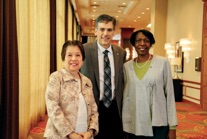


Rigoberto Hernandez, Ph.D.

Academic Record: Princeton University, B.S.E., 1989; University of California, Berkeley, Ph.D., 1993.
Honors: Stanley C. Israel Regional Award for Advancing Diversity in the Chemcial Sciences, SERMACS, 2018; Herty Medal, 2017; ACS Award for Encouraging Disadvantaged Students into Careers in the Chemical Sciences (EDSCCS), 2014; Outstanding Service Award, Georgia Local Section, 2012; ACS Fellow, 2010;
Transformational Research and Excellence in Education (TREE) Award, Research Corporation, 2016; Diversity Award, Council of Chemical Research, 2015; Phi Beta Kappa Visiting Scholar, 2015-2016; Diversity Champion Award, Georgia Tech 2013; APS Fellow, 2011; Vasser Woolley Faculty Fellow, Georgia Tech, 2011-13; Sackler Visiting Chair in Exact Sciences, Tel Aviv University, 2010; Humboldt Research Fellow, 2006-08; American Association for the Advancement of Science, Fellow, 2005; Goizueta Foundation Junior Professor, Georgia Tech, 2002-06; Alfred P. Sloan Fellow, 2000; Sigma Xi Southeast Regional Young Investigator, 2002, 2000; Research Corporation Cottrell Scholar, 1999; Blanchard Assistant Professor of Chemistry, Georgia Tech, 1999-01; National Science Foundation CAREER Award, 1997; Feinberg Postdoctoral Fellow, 1994; AT&T CRFP Fellow, 1989-93; NSF Graduate Fellow, 1989-92; and Sigma Xi, Member, 1994.
Professional Positions (for past 10 years): Gompf Family Professor, Johns Hopkins University, 2016-present; Director, Open Chemistry Collaborative in Diversity Equity (OXIDE), 2011 to date; Adjunct (2016-18), Full (2009-16), Associate (2002-09) , and Assistant (1996-2002) Professor, Georgia Institute of Technology; Co-Director of Center for Computational Molecular Sciences & Technology, 2000-16.
Service in ACS National Offices: Board of Directors (District IV, 2014-2019); Budget and Finance, Member, 2016-21, Associate Member, 2015; Committee on Professional and Member Relations, 2017-19; Committee on Science, Associate Member, 2013; Committee on Committees, 2009-12; Committee on Divisional Activities, 2004-08; Joint DAC/LSAC Subcommittee, Co-Chair, 2005-07; Board Committee on “Minorities in Academe Implementation Team,” 2003-04; Hildebrandt Award Canvassing Committee, 2002-04.
Service in ACS Offices: Member ACS since 1992. Bylaw Councilor, 2012. Georgia Section: Alternate Councilor, 2012-2013, Councilor, 2003-11; Past-Chair, 2000; Chair, 1999; Chair-Elect, 1998; Chair of Herty Award Committee, 2006-16; Chair, 75th Herty Medal Celebration 2009 and Founding Chair of Herty Medal Undergraduate Research Symposium, 2006-10. COMP Division: Alternate Councilor, 2013-2015.
Member: American Association for the Advancement of Science; American Physical Society; Biophysical Society; SACNAS. ACS Georgia Local Section. ACS Divisions: Computers in Chemistry and Physical Chemistry.
Related Activities: Journal of Physical Chemistry, Editorial Advisory Board, 2019-present; MolSSI Advisory Board, 2017-2019, vice chair 2018, and chair 2019; Academic Leadership Training (ALT) Workshop, co-Founder and Chair, 2016-present; Scialog Review Committee, Chemical Machinery of the Cell, Research Corporation, 2018-20; Research Corporation Cottrell Scholars Advisory Committee, member: 2011-17 and chair: 2016-2017; STEM Ed Review Committee, AAAS, 2015-16; Minority STEM PhD Advisory Committee, Sloan Foundation, 2013-present; Executive Board, Georgia Tech Faculty, 2013-2016; NIH MSFB Study Section, 2009-13; National Academies Board on Chemical Sciences and Technology, 2007-10; Board of Directors of Telluride Science Research Center, 2007-09; External Review Committee for Morehouse College Chemistry Department, 2007; Steering Committee for NSF Workshop on complexity and emergent phenomenon, 2007; Steering Committee for NSF Workshop on excellence empowered by a diverse workforce, 2007; National Academies Committee on advanced chemical imaging, 2005-06; published over 121 peer-reviewed articles to date.

What you should know
Name:
Rigoberto
Occupation:
Professor
Research Area:
Theoretical and Computational Chemistry
Favorite Subjects:
Theory and computing of health, energy, water, and the environment
Favorite Journal:
Journal of Physical Chemistry
Favorite Vacation Spot:
ACS National Meeting Site
Personal Motto:
“Chemistry is fun!”






Current Research Problems:
-
1.Determining energetics of protein unfolding pathways
-
2.Obtain direct and correct rates for chemical reactions using transition state theory
-
3.Characterizing the dynamics inside and of assemblies of nonequilibrium structured particles.
-
4.Predicting macroscopic fluid dynamics from molecular scale interactions
ACS Bio